This week’s blog is a re-cycle from a few years ago. Let me explain the reason for the rerun. The other night, John and I were cooking dinner. He asked If I knew what kind of salt we should be using these days. I recalled writing a salt blog a few years ago. I figured if we didn’t retain the information, perhaps neither did you.
YESTERYEAR
Remember the olden days when eggs, butter and salt were supposed to be a few of the evils of the nutritional world? That is currently old news. The aforementioned are now healthy dietary staples according to today’s findings. Butter and salt are temporarily taking a backseat as all the attention is focused on the cost of eggs!
CONSFUSION
Those of us who have had a few revolutions around the sun will recall the old fashioned “food pyramid” and the evils of certain foods. New studies has proven to debunk these antiquated ideas. Unless you do some research into the new findings, you may find yourself a bit confused and salty. What are we supposed to believe?
INTERMITTENT FASTING
Today is not the intermittent fasting blog. What John and I learned among myriad information is the necessity for a small amount of sodium consumption especially while fasting. Salt is not necessarily the evil it was once thought to be and actually necessary to replace electrolytes.
REVISIT
Too much sodium has been linked to conditions including high blood pressure, heart disease and stroke. That’s the bad news. The good news is that is has numerous benefits. Saltwater rinses are a natural remedy for those with gum disease, mouth sores or infections. Folks require sodium in moderation to conduct nerve impulses, contract and relax muscles and maintain the proper balance of water. Salt deficiency is a real thing. Look it up.
CHOICES, CHOICES
Yes, there are many choices when choosing your preferred salt including iodized table salt, kosher salt, sea salt, black and pink Himalayan salt. Did I miss any? All types of salt are made of sodium chloride and contain minerals like potassium, calcium and magnesium. Try to opt for natural salt and avoid table salt as it is heavily processed.
BENEFITS REVISITED
Today, instead of harping on the deleterious effects of sodium, let’s tout the benefits.
- Helps you stay hydrated
- Promotes good vascular health
- Balances electrolytes and prevents muscle cramping
- Supports a healthy nervous system
HDD
In summary, it is imperative to do your research and check with your provider to determine what is best for you. Suffice it to say, diagnostic ultrasound cannot see nor determine your appropriate sodium level. It can however help diagnose heart and vascular disease, blood clots, abnormal growths, gallstones, aortic aneurysm, kidney or bladder stones just to name a few. If we can be of assistance with your diagnostic ultrasound needs, call us at 505-350-3397.

